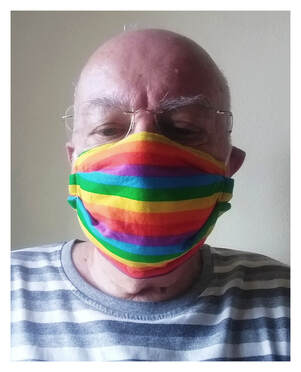|
Unlike many people I know, I have the advantage of geography to impress on me that I am living remotely from the massive issues that are impacting the world. From my vantage point away from the throbbing and deafening frontiers where anxiety is fueled by virtual proximity, I sense I have an inconspicuous benefit. I am constantly reminded that I am nowhere near centers of power and triggers of crisis. What’s more, I am all but isolated from reality about such things as what Russia is doing to Ukraine, how COVID is eroding quality of life, where religious supremacists will attack next, and when the impending mass extinction event will actually catch our attention. What I get is highly filtered news, and then even that is treated by me highly selectively.
Take today, for example. A crew is working on the electrical power lines somewhere nearby, so we have stored a supply of water and will do without electronic access to the world. But before the Internet went off I read in The Guardian that there is a divide between the older elite and the younger generation here in Thailand over Russia and Ukraine. The older generation being interviewed insisted Thailand ought to be neutral because Russia has a long history of cordial relations with Thailand and Russian tourists have been the first to come back in large numbers now that our borders are open again. The young activists interviewed were quoted in support of Ukraine as the victim and moral example of resistance to authoritarianism. My reaction was, “What?” The Guardian’s sample was far too small. Their article was one step away from nonsense. Nobody around here is saying anything about Russia or Ukraine. The price of eggs is at an all-time high, and COVID is spreading right into our neighborhood. The Songkran (Thai New Year) 3-day holiday coming this week needs planning and again the water-throwing will be cut back – so the tourists will not be coming in large numbers after all. These are matters that matter. That’s how attention-filters work. They are diverting attention not only from Europe and China, but even attention that might be paid to the slaughter of ethnic groups in Myanmar next door to Thailand. “News” producers know better than to emphasize things about which viewers cannot feel an impact. For me, way out here in the countryside, a lot of the headlines catch me by surprise, but since I know I’m only going to get headlines which are slanted to bait readers, I have sort of lost interest in keeping up. I do pick a topic now and then to focus on. It’s a hobby without expected ramifications or extended purpose. Now, I do not think of this as a disadvantage, this remoteness. I have noticed that some of my friends seem to have become fixed on alarming news in a way that absorbs them and sucks the joy out of living. I fear they have not noticed how unnecessary it is to become angry over things over which they have no control. Nor have they noticed that they have been deceived most of their lives into believing that they can make a difference. Here’s what I mean. In several countries elections are coming. This, we are supposed to believe, is our citizens’ opportunity to influence the way things work in our nations and neighborhoods. So we really, really should vote. But the day after the election when “representatives” have been chosen, those “representatives” are no longer speaking to us or listening to us. Notice how they work. Pay attention to how much of what they do is what we want or need. Representative government is no longer operating. Influence comes from money and in some places from military might or social-cultural pressure (usually conservative, protective of a select group, and against change). But I have the advantage of distance. Young people in some places really might get something accomplished to bring about sensible gun laws that might reduce mass shootings in schools, and Greta and others might get some carbon emissions reduced. I am just too far out of town, too old to set off on long marches for justice any more, and cut off from pulpits and classrooms. I am redundant and that’s OK. I know that something Biden, Putin, or Xi might do might impact our security and prosperity, but I know they will do it without me. This gives me peace of mind I probably wouldn’t have if I could get more of the New York Times than headlines, and more news than the Thai Prime Minister’s predictions about opening up for tourists. I do not regret living remotely.
0 Comments
Leave a Reply. |
AuthorRev. Dr. Kenneth Dobson posts his weekly reflections on this blog. Archives
March 2024
Categories |
| Ken Dobson's Queer Ruminations from Thailand |
|

 RSS Feed
RSS Feed
